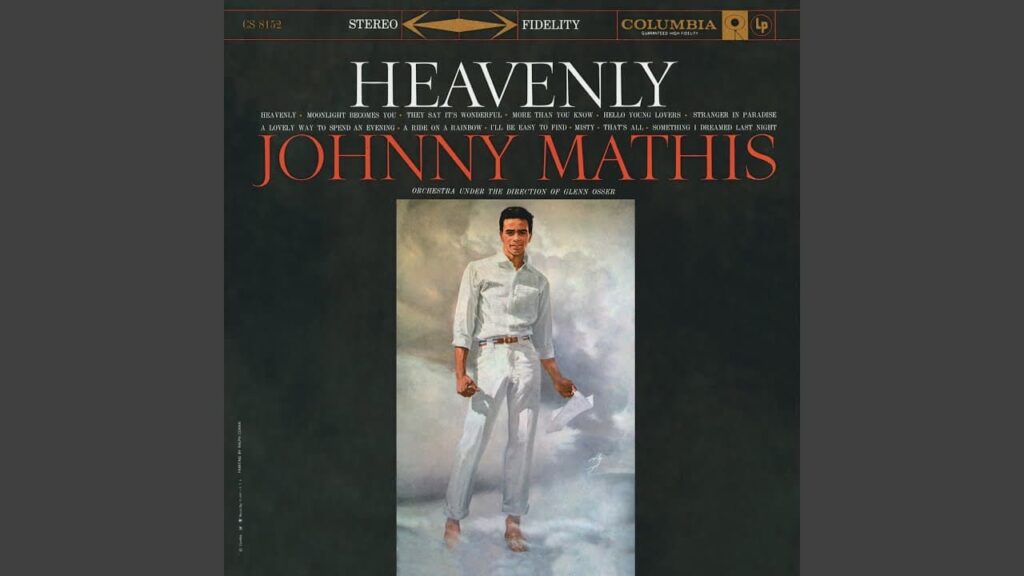
Lost in the Dream of a Perfect Love
Let’s transport ourselves to a realm of exquisite melody and timeless romance, a place where velvet vocals and lush orchestrations paint vivid pictures of love’s profound enchantment. In this elegant domain, one voice reigns supreme: that of Johnny Mathis. His artistry has consistently elevated popular song to an emotional art form, making every note a brushstroke of feeling. Today, we’re returning to a truly iconic piece from his storied career, a song that evokes the wondrous, almost otherworldly, sensation of finding love in an unexpected place: “Stranger in Paradise.”
“Stranger in Paradise” originates from the critically acclaimed 1953 Broadway musical “Kismet.” The song’s melody is famously based on the “Polovtsian Dances” from Alexander Borodin’s opera Prince Igor, with lyrics skillfully adapted by Robert Wright and George Forrest. Johnny Mathis released his definitive version of “Stranger in Paradise” in 1959, featuring it on his highly successful album “Heavenly.” This album was a monumental success for Mathis, spending multiple weeks at number one on the Billboard Top LPs chart (now the Billboard 200), firmly cementing his status as a major recording artist. While “Stranger in Paradise” was not a primary single from “Heavenly” at the time of its release, its inclusion on such a ubiquitous and beloved album ensured its widespread recognition and perpetual popularity. It had, however, already been a hit for other artists following the musical’s success, notably Tony Bennett, who reached number 1 in the UK in 1955, and The Four Aces, who had a top 5 hit in the US the same year. Mathis’s rendition, coming a few years later, became the quintessential interpretation for many, solidifying its place in the great American songbook and his own remarkable discography.
The story behind “Stranger in Paradise” is deeply intertwined with the narrative of “Kismet” itself. In the musical, the song is a love duet, sung when the characters of the Poet and Marsinah first meet, instantly falling for each other amidst the exotic backdrop of Baghdad. The lyrics perfectly capture the feeling of encountering someone so enchanting that they transform your entire world, making a familiar place feel suddenly new and wondrous, like a paradise previously unknown. For Johnny Mathis, choosing to record this particular song was a natural fit. His vocal range, his ability to convey both yearning and rapturous wonder, and his inherent romantic sensibility made him the ideal interpreter. He wasn’t just singing the words; he was inviting the listener into that very moment of discovery, where the everyday becomes extraordinary through the eyes of love. The song’s lush, romantic arrangement further enhanced its dreamlike quality, allowing Mathis’s voice to float effortlessly over a tapestry of strings and gentle percussion, creating an immersive experience for the listener.
The meaning of “Stranger in Paradise” is a poetic exploration of how love transforms perception, making the mundane sacred and the ordinary miraculous. The “paradise” isn’t necessarily a physical place, but the profound emotional state induced by the presence of a beloved. The singer feels like a “stranger” in this newly revealed paradise, overwhelmed and perhaps a little bewildered by the intense beauty and joy brought by their newfound love. Lines like “Take my hand, I’m a stranger in paradise / All alone in a world of my own” beautifully convey this sense of isolation being shattered by connection. It’s about the feeling of being utterly captivated, of having one’s reality reshaped by the sheer wonder of another person. For older listeners, this song evokes memories of those profound moments of awakening in love, where the world suddenly seemed brighter, more vibrant, and endlessly hopeful because of one special person. It speaks to the universal human experience of finding a piece of heaven, not in a distant land, but within the transformative power of a shared heart.
Listening to “Stranger in Paradise” by Johnny Mathis today is to be enveloped in pure romantic elegance. His impeccable diction, his soaring high notes, and his ability to imbue each phrase with genuine emotion create an almost cinematic experience. The rich orchestration is perfectly balanced, never overshadowing his voice, but rather enhancing the song’s dreamy atmosphere. It reminds us of an era when popular music embraced grandeur and sentimentality with unashamed beauty. This piece stands as a testament to Mathis’s enduring legacy as the voice of romance, and a timeless reminder of how a truly captivating song can transport us to our own personal paradises found through love.